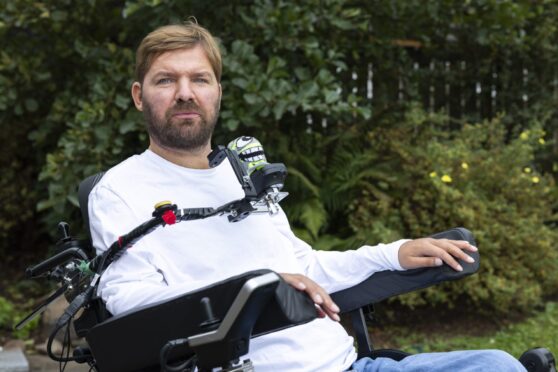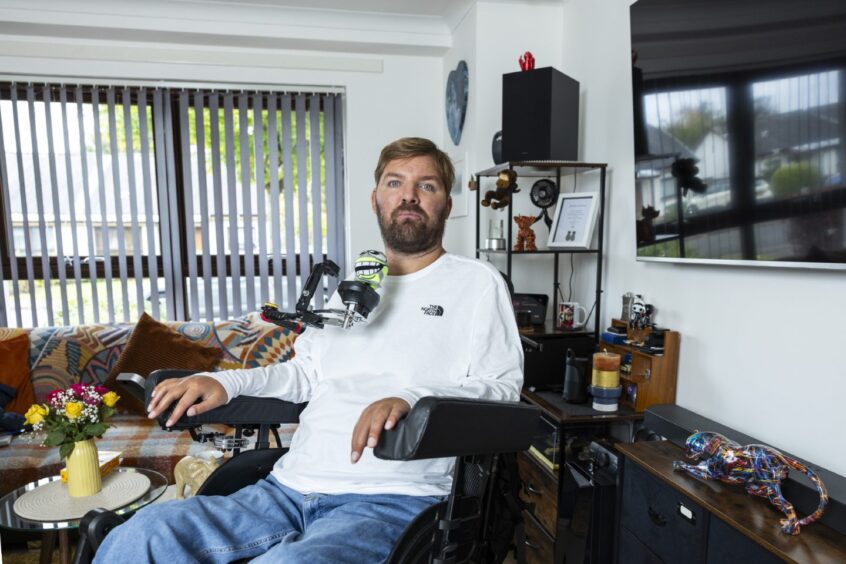
Danny Mavor looks at the pristine white motorcycle helmet that sits on a shelf in his front room.
“It probably saved my life,” he says.
Five years on from a near-fatal motorcycle crash, Danny often wishes it hadn’t.
“Living with constant pain changes how you see the world,” says Danny, who now lives in agony from the crash near Edinburgh that caused him to be paralysed from the chest down.
The former soldier says he would back laws to allow assisted dying – despite not being eligible should the issue be passed by parliament.
“I never imagined before my accident that I’d be sitting here, talking about euthanasia. But pain makes you see things differently,” he says.
“Most days my pain levels are at seven out of 10 and if I could achieve a permanent three, I would not feel like this. Considering euthanasia is my decision, but I don’t expect everyone to agree with me.”
A forthcoming Private Members’ bill on assisted dying is set to go through Westminster. It is likely to be based on Lord Falconer’s House of Lords bill proposing assisted suicide for terminally-ill adults who are mentally competent… and have an advanced progressive disease, illness or condition.
Danny, 39, from Renfrewshire, would not qualify as he has a stable traumatic injury and not a terminal illness. Danny lost all power from his chest down after being catapulted over his motorbike and damaging his spinal cord.
However, he says: “I believe that people like me should have the right to choose after speaking to their family and doctors. It’s about dignity and recognising when enough is enough. Folk should have the right to make their own choices.
“Before the motorbike accident I had no real appreciation of what it meant to be in pain and totally dependent on others for even the most basic needs like eating and more intimate personal care. My only respite or escape is sleep.”
Scotland’s Assisted Dying bill was halted recently after the Scottish Government declared that proposed legislation is outside Holyrood’s powers because lethal drugs were reserved to the Westminster government.
Danny however, argues that physician-assisted suicide should be a personal choice based on a person’s illness. “I wouldn’t want to influence anyone’s decision to opt for euthanasia. I am telling my own story.”
He disagrees with the Scottish parliament bill which included those as young as 16.
“That’s too young,” he adds.
Tearful discussions with his mother and sister have been difficult, he says. “They are my biggest concerns because they are understandably very upset.”
He reveals that when he first woke from a coma in the Queen Elizabeth University Hospital spinal injuries unit six years ago he told his mother he wished he had been killed.
“She looked at me and replied, ‘I know, Danny, I understand.’
“I knew immediately that I could feel nothing from the chest down and that this may be for the rest of my life but I never knew about the searing pain.”
Doctors suggest this is caused by damage to the nervous system, even though there is major sensory loss to the limbs.
In his previous life he climbed mountains in Morocco and Iceland and spent time living in the desert. His army career in the Royal Scots Dragoon Guards, began as a gunner, a tank driver and then a tank operator. That was followed by civilian jobs as a motor engineer working on cars, busses and even a stint with the US Army repairing military vehicles. His ability to fix and adapt virtually anything on wheels also saw him work on converting diesel buses to electric.
On a shelf in his front room is the white motorcycle helmet which survived the crash.
“It probably saved my life by preventing a fatal head injury but I suffered a C4-C3 spinal fracture.”
Critics argue that the law cannot be changed on the basis of what individuals want.
Allan House, emeritus professor of liaison psychiatry at Leeds University, said: “Who could not feel for Danny, but my argument is that if we legalise physician-assisted euthanasia, we pose risks for other people.
“It would be legislation driven by individual people’s cases without looking at the risks to others including those with disabilities, dementia or other life-changing illnesses.”
Professor House, who says he has met many patients with disabilities who wanted to end their lives, adds: “Legalising assisted suicide can become the opening for including people who don’t look like Danny, but who argue that they are being discriminated against because they have other disorders or disabilities not covered by the new law.
“There will also be pleas for including people outwith a six-month life-expectancy qualification who say they are being forced to wait for assisted dying.
“I am mindful that there is serious lobby of people who see assisted dying as a back door for loosening or extending a patient’s criteria.
“If you look at reasons in national suicide studies, they highlight people for whom life is a struggle with poverty and loneliness for example, and there is evidence these reasons have led to assisted suicide in other countries.”
He adds that his reasons are forged by experience in psychiatry, not religious beliefs.

Enjoy the convenience of having The Sunday Post delivered as a digital ePaper straight to your smartphone, tablet or computer.
Subscribe for only £5.49 a month and enjoy all the benefits of the printed paper as a digital replica.
Subscribe © Jamie Williamson
© Jamie Williamson